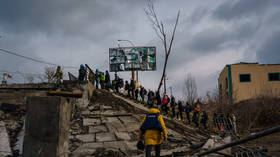Facebook and Instagram to allow calls for violence against Russians

Meta has confirmed that hate speech calling for violence is now permissible on Facebook and Instagram – as long as the targets are Russian and the topic of conversation relates to Moscow’s military offensive in Ukraine.
The revised rules on violence and incitement will apply in certain countries – such as Ukraine and Poland – and will allow violent rhetoric against Russians and Russian soldiers. The policy change was first reported by Reuters on Thursday, citing internal emails from Meta Platforms, the parent company of Facebook and Instagram. Reuters’ initial headline read: “Facebook and Instagram to temporarily allow calls for violence against Russians,” though it was later changed to “Facebook temporarily allows posts on Ukraine war calling for violence against invading Russians or Putin's death” after Meta spokesman Andy Stone called the media outlet’s take “sensational.”
“As a result of the Russian invasion of Ukraine, we have temporarily made allowances for forms of political expression that would normally violate our rules like violent speech, such as ‘Death to the Russian invaders,’” Stone said. “We still won’t allow credible calls for violence against Russian civilians,” he added.
The platforms will reportedly refrain from censoring posts that call for the death of Russian President Vladimir Putin or Belarusian President Alexander Lukashenko, according to Reuters, citing emails sent to content moderators. One message allegedly advised the moderators that they should allow calls for the assassination of Putin or Lukashenko as long as the posts don’t mention other targets.
One of the emails cited by Reuters purported to clarify that it would also be permissible to target Russians in general “where it’s clear that the context is the Russian invasion of Ukraine.” The hate speech against prisoners of war is still off-limits, the email allegedly said.
Other countries where commentators were given the green light to encourage violence against Russians reportedly include Latvia, Lithuania, Slovakia, Hungary and Romania. The revised rules also apply in Russia, though Facebook is banned in the country. The social network late last month blocked Russian media outlets for users in Europe, prompting Moscow to cut off access to the platform in Russia.
The latest relaxing of Meta’s standards follows a report last month that Facebook allowed its users worldwide to praise Ukraine’s Azov Battalion, a street militia with ties to neo-Nazism. Such commentary was previously banned under Facebook’s policy on “dangerous individuals and organizations,” but the platform eased the rule to allow users to commend the group’s efforts to defend Ukraine.
Facebook ranks as the world’s largest social media platform, with about 2.9 billion users, while Instagram is No. 4, at nearly 1.5 billion.
The decision to declare open season on hate speech against Russians comes amid a surge in anti-Russian discrimination and attacks around the world. A Russian Orthodox church in Calgary was splashed by vandals with red paint. Vandals also attacked the Russia House Restaurant in Washington, located a little more than one mile from the White House, even though the owner isn’t actually Russian.
Public officials have appeared to stoke anti-Russian sentiment. US Representative Eric Swalwell (D-California) suggested that all Russian students at American universities should be kicked out of the country. Michael McFaul, who was the Obama-Biden administration’s ambassador to Russia from 2012 to 2014, said on Twitter that all Russians are to blame for the attack on Ukraine, writing, “There are no more ‘innocent,’ ‘neutral’ Russians anymore.”
Russian athletes and even Russian cats have been banned from international competitions.













